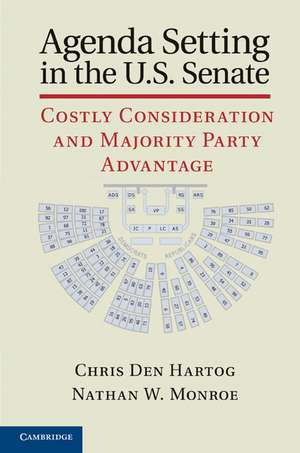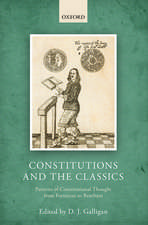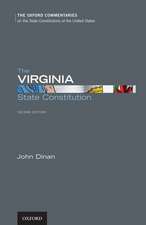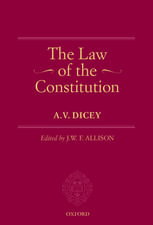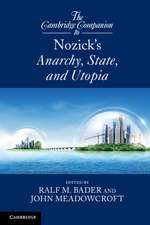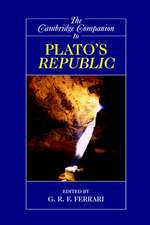Agenda Setting in the U.S. Senate: Costly Consideration and Majority Party Advantage
Autor Chris Den Hartog, Nathan W. Monroeen Limba Engleză Hardback – 15 mai 2011
Preț: 692.50 lei
Preț vechi: 778.08 lei
-11% Nou
Puncte Express: 1039
Preț estimativ în valută:
132.51€ • 138.35$ • 109.67£
132.51€ • 138.35$ • 109.67£
Carte tipărită la comandă
Livrare economică 04-18 aprilie
Preluare comenzi: 021 569.72.76
Specificații
ISBN-13: 9781107006461
ISBN-10: 1107006465
Pagini: 252
Ilustrații: 56 b/w illus. 24 tables
Dimensiuni: 157 x 234 x 22 mm
Greutate: 0.48 kg
Editura: Cambridge University Press
Colecția Cambridge University Press
Locul publicării:New York, United States
ISBN-10: 1107006465
Pagini: 252
Ilustrații: 56 b/w illus. 24 tables
Dimensiuni: 157 x 234 x 22 mm
Greutate: 0.48 kg
Editura: Cambridge University Press
Colecția Cambridge University Press
Locul publicării:New York, United States
Cuprins
Preface; Part I: 1. Costly consideration and the majority's advantage; 2. The textbook senate and partisan policy influence; 3. The costly consideration agenda-setting theory; Part II. Consideration Costs in the Senate: 4. Committees and senate agenda setting; 5. Scheduling bills in the Senate; 6. Effects of filibusters; 7. Disposition of majority and minority amendments; 8. Killing amendments with tabling motions and points of order; 9. Effects of amendments; Part III. Testing the Costly-Consideration Theory: 10. Testing our model; 11. Implications of costly consideration; Appendix A: relaxing the model's assumptions; Appendix B: last actions and coding amendment disposition.
Recenzii
'Agenda Setting in the U.S. Senate is a major contribution to scholarship about the chamber and about legislative leadership in general. In contrast to the traditional portrayal of Senate party leaders as relatively weak, Den Hartog and Monroe provide a compelling conceptual rationale and ample empirical evidence for consequential leadership within the chamber. Their masterful book belongs on the shelf of any serious student of congressional politics.' C. Lawrence Evans, College of William and Mary
'Scholars and the media have given so much attention to the filibuster and minority party power in the contemporary Senate that one would think nothing else matters. Yet, as Den Hartog and Monroe remind us, a number of major pieces of legislation manage to overcome this roadblock. In Agenda Setting in the U.S. Senate, they address this seeming contradiction and provide an essential balance in their thoughtful and carefully crafted research. Den Hartog and Monroe explain under what conditions major legislation passes the Senate and how the majority party and its leadership are far from powerless in moving their agenda forward. The book is theoretically grounded, analytically stimulating, and substantively rich.' Bruce I. Oppenheimer, Vanderbilt University
'The rise of partisanship in the contemporary Senate raises tough questions for students of Congress. How can we square evidence of majority party influence with the chamber's history of supermajority rules and practices? In Agenda Setting in the U.S. Senate, Den Hartog and Monroe offer a new perspective on parties in the Senate, suggesting that partisan influence pervades the legislative process. This book will surely turn heads as scholars grapple with Den Hartog and Monroe's impressive arguments and wide-ranging evidence. I highly recommend it.' Sarah Binder, George Washington University and The Brookings Institution
'With sensible theory and considerable empirical analysis, Den Hartog and Monroe provide a useful corrective to the two extreme views that sometimes seem to dominate portrayals of political parties and majority party agenda control in the contemporary Senate - the 'it's just like the House' argument and, on the other extreme, the 'parties don't matter' meme.' Barbara Sinclair, University of California, Los Angeles
'In recent years there have been many indications that legislative parties are consequential in the Senate, but the theoretical arguments that provide explanations for this pattern have been few and limited. In this small but important book the authors argue (both formally and informally) that the majority party has procedural advantages that make it less costly to get a final vote on its proposals than the minority party. The authors enrich their formal argument with extensive examples from Senate practice and provide support for their theoretical predictions with solid systematic evidence. This book will receive a lot of deserved attention from students of the Senate, and it will influence the course of future research.' David W. Rohde, Duke University
'Scholars and the media have given so much attention to the filibuster and minority party power in the contemporary Senate that one would think nothing else matters. Yet, as Den Hartog and Monroe remind us, a number of major pieces of legislation manage to overcome this roadblock. In Agenda Setting in the U.S. Senate, they address this seeming contradiction and provide an essential balance in their thoughtful and carefully crafted research. Den Hartog and Monroe explain under what conditions major legislation passes the Senate and how the majority party and its leadership are far from powerless in moving their agenda forward. The book is theoretically grounded, analytically stimulating, and substantively rich.' Bruce I. Oppenheimer, Vanderbilt University
'The rise of partisanship in the contemporary Senate raises tough questions for students of Congress. How can we square evidence of majority party influence with the chamber's history of supermajority rules and practices? In Agenda Setting in the U.S. Senate, Den Hartog and Monroe offer a new perspective on parties in the Senate, suggesting that partisan influence pervades the legislative process. This book will surely turn heads as scholars grapple with Den Hartog and Monroe's impressive arguments and wide-ranging evidence. I highly recommend it.' Sarah Binder, George Washington University and The Brookings Institution
'With sensible theory and considerable empirical analysis, Den Hartog and Monroe provide a useful corrective to the two extreme views that sometimes seem to dominate portrayals of political parties and majority party agenda control in the contemporary Senate - the 'it's just like the House' argument and, on the other extreme, the 'parties don't matter' meme.' Barbara Sinclair, University of California, Los Angeles
'In recent years there have been many indications that legislative parties are consequential in the Senate, but the theoretical arguments that provide explanations for this pattern have been few and limited. In this small but important book the authors argue (both formally and informally) that the majority party has procedural advantages that make it less costly to get a final vote on its proposals than the minority party. The authors enrich their formal argument with extensive examples from Senate practice and provide support for their theoretical predictions with solid systematic evidence. This book will receive a lot of deserved attention from students of the Senate, and it will influence the course of future research.' David W. Rohde, Duke University
Notă biografică
Descriere
Proposes a new theory of Senate agenda setting.
